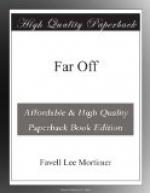The Affghans are a temperate people; they live chiefly upon fruit with a little bread; and as they are Mahomedans, they avoid wine, and drink instead iced sherbets, made of the juice of fruits. In winter excellent dried fruits supply the place of fresh.
But the Affghan, though living on fruits, is far from being a harmless and amiable character; on the contrary, he is cruel, covetous, and treacherous. Much British blood has been shed in the valleys of Affghanistan.
We cannot blame the Affghans for defending their own country. It was natural for them to ask, “What right has Britain to interfere with us?”
A British army was once sent to Affghanistan to force the people to have a king they did not like, instead of one they did like.
I will tell you of a youth who accompanied his father to the wars. This boy looked forward with delight to going as a soldier to a foreign land, and his heart beat high when the trumpet sounded to summon the troops to embark. Joyfully he quitted Bombay, crossed the Indian Ocean, and landed near the mouth of the Indus. When the army began its march towards Affghanistan, he rode on a pony by his father’s side.
At first it seemed pleasant to pitch the tent in a new spot every day, to rest during the heat, and to travel in the dead of the night, till the sun was high in the sky. But soon this way of life was found fatiguing, for the heat was great, and the water scarce. The air, too, was clouded by the dust the troops raised in marching; and green grass was seldom seen, or a shady tree under which to rest. The food, too, was dry and stale, and no fresh food could be procured, for the Affghans, before they fled, destroyed the corn and fruit growing in the fields, that their enemies might not eat them. The camels, too, which bore the baggage of the British army, grew ill from heat and thirst; for it is not true that camels can live long without water; in three or four days they die. Besides this, the hard rocks in the hilly country hurt their feet, and hastened their death. Many a camel died as it was seeking to quench its thirst at a narrow stream in the valley, and its dead body falling into the water, polluted it. Yet this water the soldiers drank, for they had no other, and from drinking it they fell ill. The father of the youthful soldier was one of these, and he was compelled to stop on the way for several weeks; and because the heat of a tent was too great, he took shelter in a ruined building. Here his son nursed him with a heavy heart. Where was the delight the youth had expected to find in a soldier’s life?




